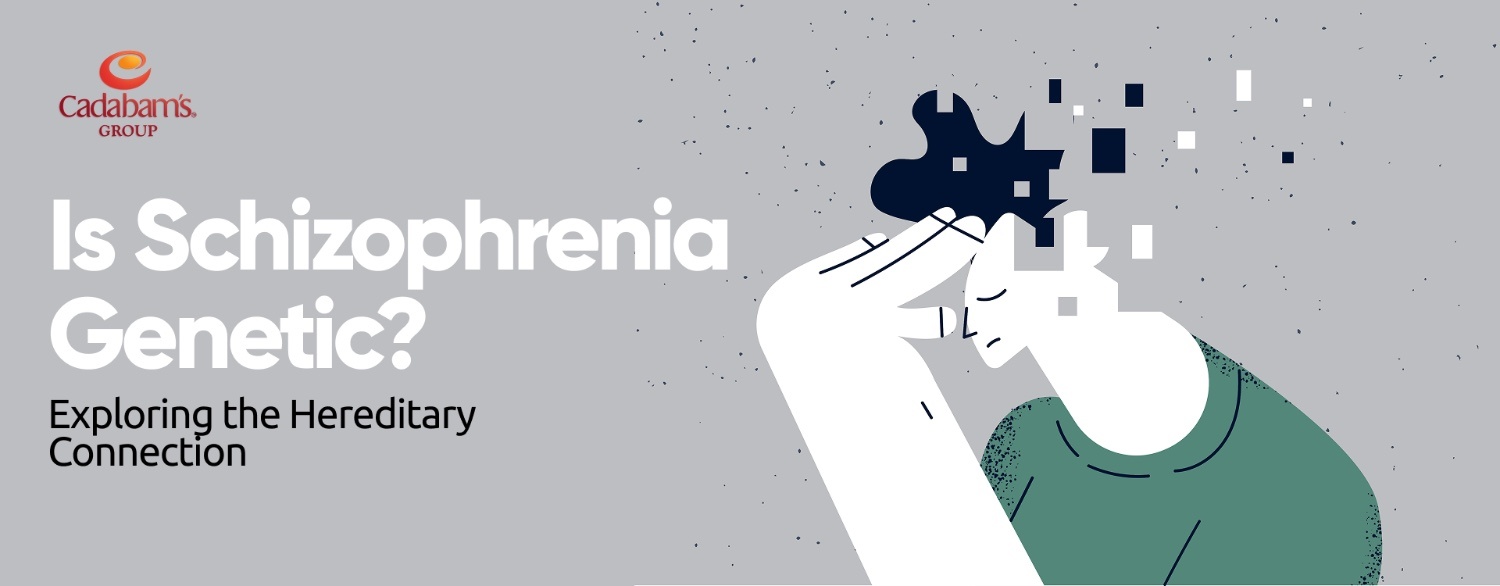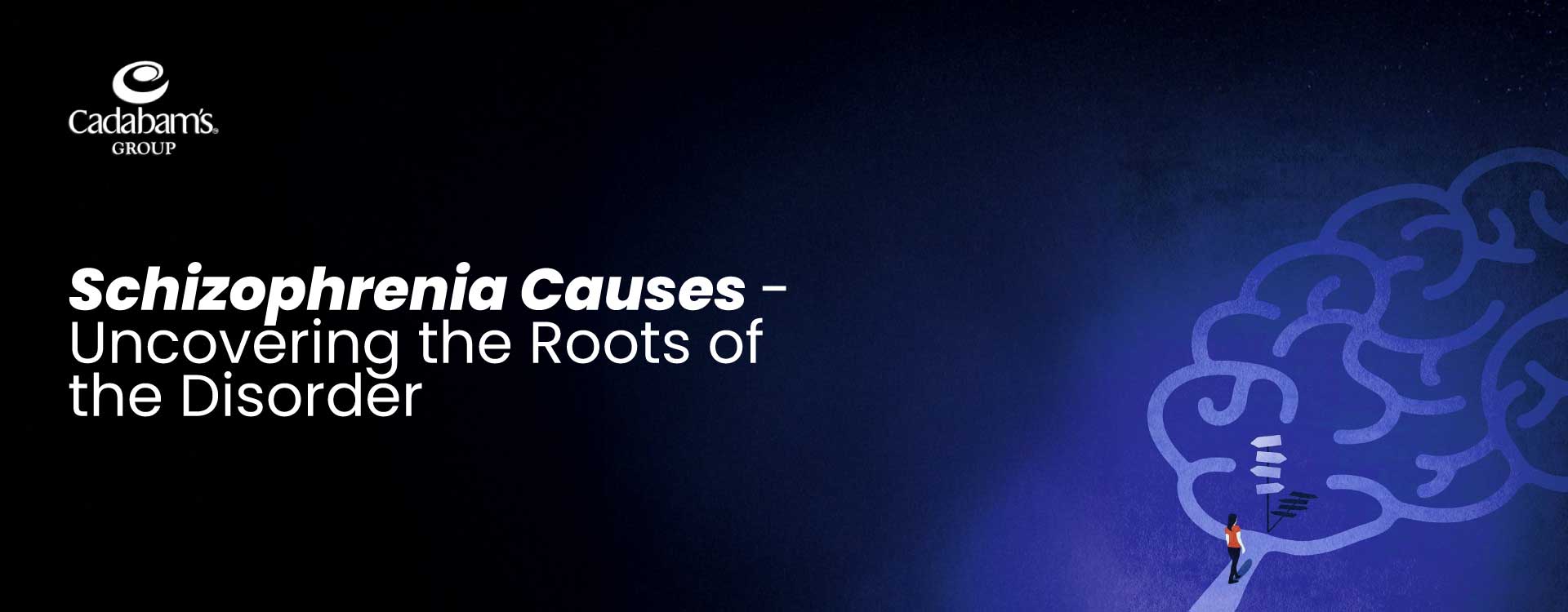Schizophrenia is a severe mental illness that disrupts a person's thoughts, emotions, and behavior. The cause for this condition is still under investigation, but genetics are believed to be a major contributing factor. While there is not just one schizophrenia gene, it takes multiple genetic changes or mutations to increase the susceptibility to the condition. It is more likely that a person will develop a mental illness by 10% if a close family member, like a parent or sibling, is affected.
Understanding the Genetics of Schizophrenia
Genetics sure increases the chances of developing schizophrenia, but it’s not just one single gene but a combination of multiple genes that leads to a higher risk. However, scientists have not found how genetic alteration led to schizophrenia, but individuals with the disorder have some problems in their genetics that interfere with brain development. Having a single parent with schizophrenia increases the chances by 8-15% while having both parents with the disorder increases the chances by up to 40%. The complex interplay of genetics has hidden the exact nature of genetic transmission, so the plausible result suggests genetics interacting with various non-genetic factors can lead to schizophrenia.
The Role of Genetics in Schizophrenia
Multiple studies have shown that schizophrenia is highly heritable; having a close relative or twin suffering from the condition increases the chances of having it also. The mental health condition is not caused by a single gene mutation but rather by a complex interplay of multiple genes, each with a small effect. These genes influence brain functions, including neurodevelopment, neurotransmission, and synaptic pruning. Genetic variations like common genetic polymorphisms, rare mutations with larger effects, and chromosomal abnormalities such as deletions or duplications of genetic material contribute to schizophrenia risk.
Key Genetic Findings in Schizophrenia Research
Research on schizophrenia has made a significant difference in uncovering the genetic landscape of the disorder.
- Polygenic nature: schizophrenia is caused by a complex interplay of multiple genes, each with a small effect. These genes influence various brain functions like neurodevelopment, neurotransmission, and synaptic pruning.
- Common genetic polymorphisms: While each single nucleotide polymorphism has a slight variation, having many of these risk-associated variants can add up and increase susceptibility to schizophrenia.
- Rare copy number variants (CNVs): These are deletions or duplications of larger sections of DNA that can have a more significant impact on schizophrenia.
- Neuronal function: Many of the genes implicated in schizophrenia point to disruptions in how neurons function, particularly at synapses.
Heritability- How Genetics Influence Schizophrenia Risk?
The inheritance pattern is not very simple when it comes to schizophrenia. Studies suggest schizophrenia is highly heritable, which means having a close relative with the condition significantly increases the risk. Identical twins have a much higher risk compared to fraternal twins. Also, having a parent or sibling with schizophrenia increases susceptibility to the disorder. Additionally, a single gene mutation doesn't cause schizophrenia; rather, a complex interplay of various genes causes it. Common polymorphisms and rare mutations are some genetic variations that also contribute to the risk.
Genetics vs. Environment in Schizophrenia
Schizophrenia has a strong heritability. Having a close relative or sibling with the disorder increases the chances of developing the disorder. Additionally, a complex interplay of many genes, each with a small effect, leads to the condition. Genetics is not the sole reason for this condition; environmental factors also play a crucial role. Exposure to infections or malnutrition during pregnancy, a stressful childhood, and substance abuse fall under environmental factors.
Environmental Factors and Genetic Predisposition
There is a fascinating and complex interplay when it comes to schizophrenia. An individual who inherits these genes is more likely to develop the disorder than one who does not inherit them. However, genetic disposition doesn't guarantee schizophrenia. Environmental factors like prenatal exposure to infection, childhood stress, and substance abuse interact with the genetic predisposition to schizophrenia. It's not that simple; the same environmental factor might have different effects on people with varying genetics.
Understanding Epigenetics in Schizophrenia
Epigenetics explores how the environment influences genetics without changing the underlying DNA code. There’s a theory that suggests environmental factors during critical developmental periods can leave epigenetic marks on genes related to brain development, neurotransmission, and synaptic function. Prenatal exposure to toxins and childhood trauma could leave epigenetic marks that alter gene expression. Unlike DNA mutations, epigenetic modifications are reversible.
Genetic Testing and Schizophrenia
At the present time, there is no single test that can diagnose schizophrenia. With advanced genetic testing, one might get information about the presence of genes that are associated with the disorder. Combining this information with an individual’s clinical and family history, one can provide a potential future diagnosis.
The Pros and Cons of Genetic Testing for Schizophrenia
Genetic testing is a debatable topic with various advantages and disadvantages. Let's explore the pros and cons of it:
Pros:
- Genetic testing can offer more knowledge about someone with a family history of schizophrenia.
- It can pave the way for future research on better treatment and prevention strategies.
- High-risk individuals can get a potential diagnosis that can allow for early intervention strategies.
Cons:
- Current tests can’t definitively predict the development of the disorder
- A positive test result doesn’t currently change the treatment approach
- Positive results can have a psychological impact on the individual
Future Directions in Genetic Testing
Researchers are incessantly working on developing treatment strategies, accurate diagnoses of the disorder, and tools to get a better picture of schizophrenia risk.
- Non-invasive prenatal testing (NIPT): this testing currently screens for chromosomal abnormalities which could be expanded to detect a broader spectrum of genetic conditions. Carrier screening expansion will allow for the identification of individuals who carry genes for recessive genetic disorders.
- Polygenic risk scores (PRS): PRS combine the effects of multiple genetic variations associated with a particular disease. Assessing risk for complex diseases and personalizing prevention and treatment.
- Pharmacogenomics: genetic testing could help determine the metabolization of drugs, allowing doctors to prescribe effective medications.
Implications of Genetic Research on Treatment and Prevention
Genetic research holds immense promise for revolutionizing healthcare by offering insights into disease development and paving the path to more effective treatment and prevention. It can help researchers to develop drugs that target the causes of the disorder. The unique genetic makeup can help develop personalized medicines and gene therapy. Early detection can identify individuals at high risk for developing the disease, which can enhance disease prevention. Knowing genetic susceptibility can empower individuals to adopt preventive lifestyle changes. Rehabilitation programs for schizophrenia at Cadabams are comprehensive and designed to address the multifaceted needs of individuals diagnosed with schizophrenia. These programs aim to help patients manage symptoms, enhance their quality of life, and improve their functioning.
Cadabams' Insight: Genetic Web of Schizophrenia
Schizophrenia affects thousands of people across the world. This chronic mental health condition is largely incurable, but there are effective treatments available to manage the disorder. Cadabams has been helping individuals with schizophrenia lead a fulfilling life for more than three decades. Our team of professionals leverages evidence-based treatments and a holistic approach to effectively manage the disorder. If you are searching for a solution to your problem, Cadabam’s Rehabilitation Centre can help you with its team of specialized experts. We have been helping thousands of people live healthier and happier lives for 30+ years. We leverage evidence-based approaches and holistic treatment methods to help individuals effectively manage their Schizophrenia. Get in touch with us today. Our team of expert healthcare professionals works tirelessly to offer the best possible schizophrenia treatment centers. Get in touch with us today. You can call us at +91 96111 94949.
FAQs
1. How strongly is schizophrenia linked to genetics?
Schizophrenia and genetics are highly linked with each other. Studies suggest around 80% of the risk of developing the disorder is due to genetics. Multiple genes work together to increase the risk.
2. Can genetic testing predict schizophrenia?
It is not a definitive predictor of schizophrenia, as the disorder is caused by a combination of multiple genes, and researchers haven’t identified all the genes involved. However, genetic testing can reveal an increased risk for schizophrenia, especially if an individual has a family history of the disorder.
3. Is schizophrenia inherited from parents?
Schizophrenia isn’t directly inherited from parents; it is a complex mental health disorder that has genetic components contributing to the disorder. Having a close relative surely increases the risk, but there’s still a high chance of the disorder not developing.
4. What role does epigenetics play in schizophrenia?
Epigenetics offers clues about how genes and a person's environment affect the chance of becoming afflicted with a disease. Research suggests that epigenetic changes in the brain affect the expression of genes involved in brain development, neurotransmitters, and immune function.
5. Are there preventive measures for those with a genetic risk of schizophrenia?
Some approaches may help reduce the risk or lessen the severity of symptoms. Regular mental health checkups, managing stress, and maintaining a healthy lifestyle can keep the development of schizophrenia in check. Additionally, one can limit substance use, which can worsen the symptoms of the disorder.
.webp)







